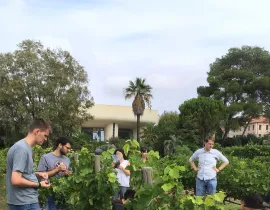Research
Grapevines facing the 2019 heatwave: new genes for heat tolerance
02/12/2024
Update : 02/12/2024

Heatwaves are increasingly challenging for agriculture in France and worldwide. A recent study carried out at the Institut Agro Montpellier in collaboration with INRAE researchers provides new hopes for the future of viticulture.
By analysing more than 250 grape varieties during the record-breaking heatwave of June 2019, the scientists identified regions of the grapevine genome involved in tolerance to extreme heat. Their findings, published in New Phytologist, pave the way for new advances in crop adaptation to climate change.

The challenge of the 2019 heatwave
Heatwaves are becoming more frequent and intense in France, and we urgently need to adapt our agricultural practices.
The team of Montpellier scientists from UMR LEPSE (Laboratory of Plant Ecophysiology under Environmental Stresses) and AGAP (Genetic Improvement and Adaptation of Mediterranean and Tropical Plants) has explored the responses of grapevine varieties to extreme heat, taking advantage of the exceptional event of June 2019 when temperature reached 46°C at Vérargues in the Hérault region – still the national record today.
Resistant grape cultivars
The experiment carried out in Montpellier at the Pierre Galet experimental vineyard on the campus – just a few kilometres from the record-breaking site – revealed significant results about the diversity of grapevine responses to extreme heat. While some varieties showed severe leaf burning damages, others remained unaffected by the heatwave.
The researchers used an 'association genetics' approach to map the regions of the grapevine genome associated with heat tolerance. They identified six loci, highlighting clusters of genes related to the management of oxidative stress and to high temperature signalling.

Transpiration and leaf temperature regulation
One surprising aspect of their findings is the absence of candidate genes involved in the control of transpiration. Yet evaporative cooling is key for the regulation of leaf temperature, as confirmed by biophysical simulations. The authors suggest a trade-off between the plant's need for cooling and the availability of water in the soil, which would be crucial during heatwaves that often coincide with periods of drought.
The discovery of six loci called BLAZE (Burned Leaves After heatwave and Zonal Sun Exposure) suggests it is possible to breed new cultivars for enhanced heat tolerance, thus adapting grapevine to climate change
–The authors of the article
Which prospects for viticulture?
These results offer promising prospects for the future of viticulture in the face of climate change, which originates an intensification of extreme climatic events. The use of the genetic markers identified in this study could contribute to the genetic improvement of grapevines and possibly other crops. The combination of agronomic levers will be essential to adapt our crops to the challenges of tomorrow's climate.
References
- Aude Coupel-Ledru, Adrianus J. Westgeest, Rami Albasha, Mathilde Millan, Benoît Pallas, Agnès Doligez, Timothée Flutre, Vincent Segura, Patrice This, Laurent Torregrosa, Thierry Simonneau, Florent Pantin (2024). Clusters of grapevine genes for a burning world. New Phytologist.
DOI: 10.1111/nph.19540
Contacts
L'Institut Agro Montpellier
2 place Pierre Viala
34060 Montpellier - France
Tél. : +33 (0)4 99 61 22 00 Tél. : +33 (0)4 99 61 22 00
Fax : +33 (0)4 99 61 29 00
contact@supagro.fr















